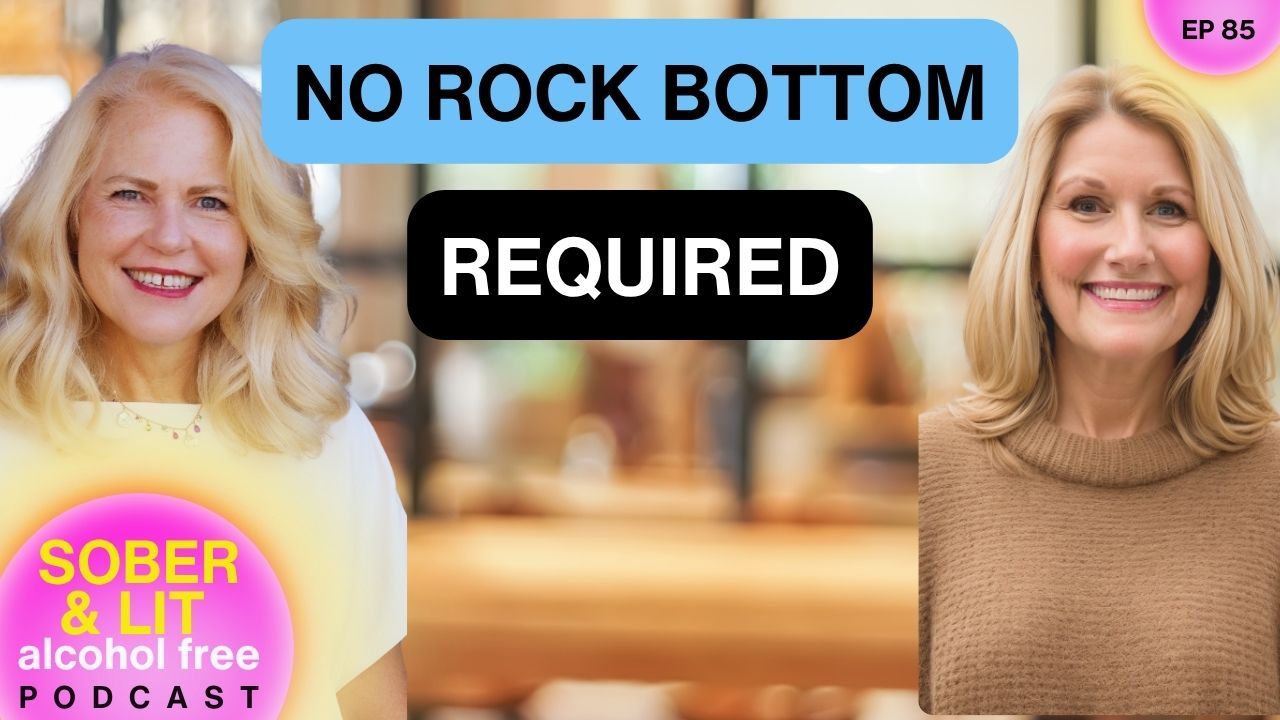Ep. 85 No Rock Bottom Required to Quit Drinking: What If You Just Want to Feel Better?
Aug 26, 2025
Listen to the PODCAST Here
Watch the Podcast on YouTube Here
You Don't Have to Hit Rock Bottom: Rethinking Alcohol, Wellness, and the Power of Taking a Break
Challenging the Rock Bottom Myth
For years, the idea that you must “hit rock bottom” before making changes to your drinking has been woven into our collective mindset. But what if that’s not only false, but also harmful? In the recent episode of the Sober and Lit Podcast, coaches Ruby Williams and Susan Larkin get real about their own journeys out of the gray area of drinking, exposing why you don’t have to wait for catastrophe to make a positive change.
Too often, we compare ourselves to dramatic stereotypes—the person who’s lost a job, gotten a DUI, or “drinks from a paper bag on the street.” Ruby, for instance, recalls telling herself, “I’m not an alcoholic. I haven’t had a DUI. I haven’t lost my job. So I must be fine.” But as both Ruby and Susan found, that kind of black-and-white thinking keeps us stuck. “You’re allowed to just not feel good and want to take a break,” Ruby explains. “You don’t need a dramatic bottom to explore what could feel better.”
Normalizing the Gray Area
The gray area between “occasional drinking” and “full-blown addiction” is vast—and it’s where most people actually live. As Susan points out, only about 10% of heavy drinkers are physically addicted and require medical intervention. The rest might drink more than they’d like for a host of reasons: stress, habit, social expectations, or emotional numbing.
One of the biggest stumbling blocks is that, socially, we’ve normalized behaviors that aren’t actually healthy. Susan shares, “You go to book club and everyone brings a bottle—and they’re all gone by the end of the night. So now, several bottles a week just seems normal.” For many, the pandemic amplified drinking, and for women especially, alcohol begins to impact sleep, anxiety, gut health, and even hormones.
Yet when someone considers taking a break, it’s often met with confusion or even the suggestion that they're overreacting. As Susan says, “We never say to someone going vegan, ‘Isn’t that extreme?’” When it comes to alcohol, though, the social narrative is different—one that deserves challenging.
The Power of Curiosity and Experimentation
If something doesn’t make you feel good—be it gluten, dairy, late nights, or alcohol—why not try living without it and see what happens? As Ruby and Susan advocate, treating an alcohol-free period as an experiment rather than a life sentence can open new doors.
You don’t have to label yourself or make any declarations. Try a 21- or 30-day break. Notice your sleep, mood, and self-esteem. Pay attention to whether your anxiety shifts, if you feel more energized in the mornings, or if a sense of calm returns by simply not worrying about the after-effects of drinking. As Ruby shares, “Even just eliminating the nightly health worries brought a sense of relief. I could finally focus on living up to my potential.”
Community, Support, and the Joy of the Journey
Making even a temporary change doesn’t mean going it alone. Today’s sober-curious movement is vibrant and supportive: from online groups to podcasts, books (“quit-lit”), and coaching communities. Both hosts emphasize that you’re not flawed if you need or want help—quitting something designed to be addictive is hard for everyone, not just a select few.
Moreover, taking a break from alcohol isn’t about deprivation, but discovery. “It’s an adventure, an exploration of what’s possible,” says Ruby. Many people find they’re able to embrace emotions, pursue goals they’d shelved for years, and reengage with life in surprisingly joyful ways. As Susan describes, “The joy is in the journey. The ‘boulder’ of alcohol rolls away, and suddenly, your purpose and potential have room to flourish.”
Finding Glimmers: The Art of Noticing Everyday Joy
A recurring theme in the episode—and crucial in any alcohol-free experiment—is learning to notice and nurture “glimmer” moments. These are small sparks of joy: a beautiful sky, the warmth of sun, the scent of fresh coffee, or a genuine connection with a friend. Cultivating gratitude and presence not only makes life richer, but also fills the void that many hope alcohol will address.
Conclusion: No Rock Bottom Required
You’re allowed to want more for yourself—more calm, more energy, more purpose—without a crisis forcing your hand. Reframing the alcohol question as one of curiosity, rather than catastrophe, liberates you to take action whenever you’re ready. As Ruby and Susan urge:
***Don’t wait for rock bottom. If you want to feel better, start now. The sooner, the better.***
______
Listeners have said that our podcast has helped them get alcohol free! So we created Feel Lit 21, a way for you to press your reset button and take a 21 day break from alcohol. Every day you will receive emails with videos, journal prompts, and the inspiration you need to embrace 21 days without alcohol that feels lit!
https://feellitpodcast.com/FeelLit21-sg
Find community and connection on the Feel Lit Alcohol Free Facebook Page: https://www.facebook.com/groups/feellitalcoholfreepodcast
Ruby Williams at Freedom Renegade Coaching https://www.freedomrenegadecoaching.com/
Follow Coach Ruby: @rubywilliamscoaching
🧡 Email: [email protected]
